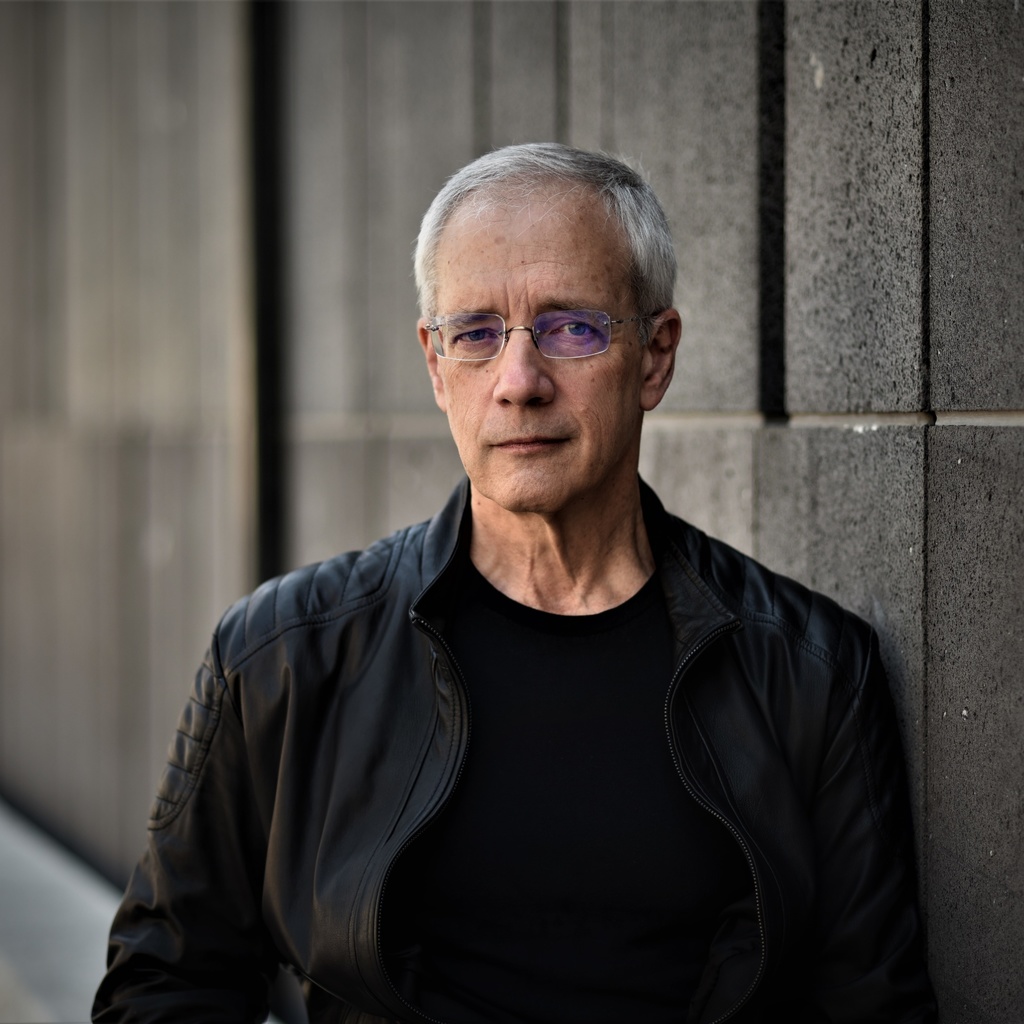Main navigation
Earn your MA in Composition Studies
The composition faculty teach individual composition lessons at two levels: undergraduate composition for students working toward the Bachelor of Music degree and graduate composition for composers in the MA and PhD programs.
The Center for New Music, directed by Professor David Gompper, presents a number of concerts of contemporary music each semester, often including thesis compositions by student composers. Review more composition resources.
Professor Jean-Francois Charles directs the Electronic Music Studios, and teaches a two-course sequence in composition with electronic media (MUS:4250 and MUS:4251). All composition students participate in a weekly composition seminar (MUS:3230), a forum for occasional guest speakers and for student presentations. Both the student-run Composers Workshop and the Electronic Music Studios present concerts of works by composition students. Composition students and faculty also participate in the Midwest Composers Symposium, which meets annually at one of several member institutions for two days of concerts of music by student composers.
How to apply to the program
Specific admission requirements
- A minimum undergraduate grade-point average of 3.0, documented by official copies of transcripts.
- Three letters of recommendation.
- A current resumé including a list of compositions with instrumentation, performances of compositions, and a summary of composition study listing composition teachers.
- In addition to the UI Graduate College application.
- Applicants must submit three scores along with recordings (mp3/wav/aiff) of original compositions; materials should be sent directly to David Gompper.
Admission to the composition degree program requires a favorable evaluation of the portfolio by the composition faculty, and approval by the Head of the Composition/Theory Area and the Director of Graduate Studies. Students applying for fall admission must submit a complete application by the application deadline; later applications will be considered if openings remain.
Requirements and program planning
This information is intended to assist in your course planning but is not intended to serve as an official guide to graduation requirements. To confirm progress toward graduation, you should consult your advisor.
General requirements
- Introduction to Graduate Study in Music (MUS:5300), 2 semester hours
Music theory requirements
Students exempt from MUS:5200 through the advisory examination in music theory must complete 6 semester hours from the following:
- Counterpoint Before 1600 (MUS:4200), 3 semester hours
- Counterpoint After 1600 (MUS:4201), 3 semester hours
- Jazz Theory (MUS:4730), 3 semester hours
- Tonal Analysis (MUS:5235), 3 semester hours
- Non-Tonal Analysis (MUS:5236), 3 semester hours
- Analysis of Popular Music (MUS:5237), 3 semester hours
- Special Topics in Theory and Analysis (MUS:5240), 3 semester hours
- History of Ideas in Music (MUS:6210), 3 semester hours
- Theoretical Approaches to Music (MUS:6211), 3 semester hours
- Theory Pedagogy (MUS:6215), 3 semester hours
- Advanced Tonal Theory and Analysis (MUS:6250), 3 semester hours
- Advanced Non-Tonal Theory and Analysis (MUS:6251), 3 semester hours
- Advanced Theory and Analysis of Popular Music (MUS:6252), 3 semester hours
Music history requirements
Select from the music history courses in the following list. Only one 4000-level course (taken at the University of Iowa or equivalent transferred in from another institution) may count toward the 6 semester hours required:
- Music and Gender (MUS:4320), 3 semester hours
- Medieval and Renaissance Music (MUS:4325), 3 semester hours
- Baroque Music (MUS:4330), 3 semester hours
- 18th-Century Music (MUS:4335), 3 semester hours
- 19th-Century Music (MUS:4340), 3 semester hours
- 20th-Century Music (MUS:4345), 3 semester hours
- Advanced Jazz History (MUS:4350), 3 semester hours
- American Music (MUS:4355), 3 semester hours
- Jazz Matters (MUS:4360), 3 semester hours
- Studies in Film and Music (MUS:4610), 3 semester hours
- Teaching Music, History, and Culture (MUS:6305), 3 semester hours
- Topics in Musicology (MUS:6310), 3 semester hours
- Historical Approaches to Music (MUS:6312), 3 semester hours
- Topics in Ethnomusicology (MUS:6314), 3 semester hours
- Foundations of Ethnomusicology (MUS:6315), 3 semester hours
- Renaissance Music Notations (MUS:6326), 3 semester hours
- Music Editing (MUS:6375), 3 semester hours
Composition area requirements
- Advanced Composition (MUS:5220), 2 semester hours
- Note: Four semesters required
- Seminar in Composition (MUS:3230), 1 semester hour
- Note: Four semesters required
- Composition: Electronic Media I (MUS:4250), 3 semester hours
- MA Thesis (MUS:6950), 1 semester hour
- Note: Completed during final semester in residence.
Electives
Choose 9 semester hours from the following:
- LOUi: Laptop Orchestra (MUS:3190:002), 1 semester hour
- Note: Repeatable course
- The Spectral Nature of Sound (MUS:3280), 3 semester hours
- Creating New Musical Instruments (MUS:3285), 3 semester hours
- Counterpoint After 1600 (MUS:4201), 3 semester hours
- Orchestration (MUS:4220), 3 semester hours
- Composition: Electronic Media II (MUS:4251), 3 semester hours
- Advanced Post-Tonal Theory and Analysis (MUS:6251), 3 semester hours
Area keyboard examination
Demonstrate basic keyboard ability in one of two ways:
- Take and pass Keyboard Harmony (MUS:4210) with a B or better
- Take and pass the final examination for MUS:4210, by arrangement with the organ faculty
Thesis composition
- The thesis composition must be at least ten minutes in duration and for a medium which demonstrates technical mastery, without exceeding the possibilities of actual performance by School of Music forces. Whenever possible the thesis composition should be tested in a reading session or performance prior to the final examination.
- Before the end of the second year of residency the student must present a proposal for the thesis composition to the composition faculty. The thesis proposal should:
- Describe the planned composition.
- Nominate a member of the composition faculty holding a regular (tenured/tenure-track) faculty position in the School of Music as the thesis advisor and chair of the thesis committee.
- Nominate two additional composition faculty (regular or visiting) as members of the thesis committee. Approval of the thesis proposal and the nominations of the advisor and thesis committee requires a vote of the composition faculty. The committee membership must be endorsed by the Composition/Theory Area Head, and forwarded to the Associate Director for Graduate Studies.
MA final examination
A written examination, administered in three four-hour sessions, evaluating the student’s mastery of:
- Music history and literature of all periods
- Music analysis
- Practical skills in harmony, counterpoint and composition
The final examination committee is distinct from but may have the same members as the thesis committee. The final examination committee consists of three faculty members; at least two, including the committee chair, must be from the composition faculty. A visiting faculty member may serve on but may not chair the committee.
The final examination committee is nominated by the student in consultation with the thesis advisor, and approval of its membership requires a vote by the composition faculty. The committee membership must be endorsed by the Composition/Theory Area Head, and forwarded to the Associate Director for Graduate Studies.
Create your academic path
You'll find degree overviews, requirements, course lists, academic plans, and more to help you plan your education and explore your possibilities.
Current course list
The MyUI Schedule displays registered courses for a particular session and is available to enrolled students. The list view includes course instructors, time and location, and features to drop courses or change sections.
Composition resources
Midwest Composers Symposium
The University of Iowa School of Music's Composition Area participates in the Midwest Composers Symposium, a consortium comprising the University of Illinois, the University of Michigan, Indiana University, Oberlin Conservatory, and Iowa. Each year a symposium takes place at one of the member campuses and works from each are presented.
Awards
The school offers the Henry and Parker Pelzer Award in Composition, major cash prize awarded each spring to an outstanding composer. Details of eligibility can be obtained from the area head.
The Composers Workshop
The Composers Workshop offers typically four programs of new works composed on campus each semester. One of the assistantships offered in composition includes the management of this series.
Center for New Music
A major feature of the composition program is its intimate connection with the School's Center for New Music. The center offers typically four concerts per academic year, and all rehearsals are open.
Electronic media
The area offers instruction in analog and digital electronic media, and encourages the formation of improvisational and experimental ensembles. The school's many students of performance frequently take part in the creation of new works by Iowa's graduate composers.
Academic music
Please visit Music Studies @IOWA to learn more about our recent scholarly activities, our current students and alumni, colloquium series, and other events.
Add a minor
Any student admitted to a graduate degree program in the School of Music may add a theory pedagogy minor by completing the required courses.
Composition faculty

Joshua Albrecht
Matthew Arndt
Jean-François Charles

David Gompper
Kati Meyer
Sam Young
Practice and perform
Need to book a music room, request an accompanist, check out audition information, rent a locker, or use a recording studio? Visit the Music Callboard for all scheduling and policy information.